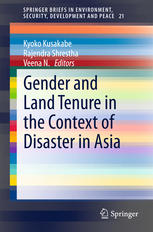

Most ebook files are in PDF format, so you can easily read them using various software such as Foxit Reader or directly on the Google Chrome browser.
Some ebook files are released by publishers in other formats such as .awz, .mobi, .epub, .fb2, etc. You may need to install specific software to read these formats on mobile/PC, such as Calibre.
Please read the tutorial at this link: https://ebookbell.com/faq
We offer FREE conversion to the popular formats you request; however, this may take some time. Therefore, right after payment, please email us, and we will try to provide the service as quickly as possible.
For some exceptional file formats or broken links (if any), please refrain from opening any disputes. Instead, email us first, and we will try to assist within a maximum of 6 hours.
EbookBell Team

4.0
86 reviewsThis book explores an interdisciplinary field at the intersection of gender and development studies, disaster and land tenure policy. It is well known that women generally have weaker claims to land. But how does that translate to increased vulnerability during disaster? Using case studies from Asia, this book argues that land tenure is a key factor in mitigating the impact of disasters on women. The scale and frequency of disasters have been increasing in recent decades due to human impact on the landscape and climate. Unsustainable farming and land management systems have increased environmental risks and social vulnerabilities. However, around the world the costs of disasters are disproportionately borne by women, due largely to their reduced mobility and lack of control over assets. In post-disaster settings, women’s vulnerabilities increase due to gendered rescue and rehabilitation practices. As such, a gendered approach to land rights is critical to disaster preparedness and recovery.